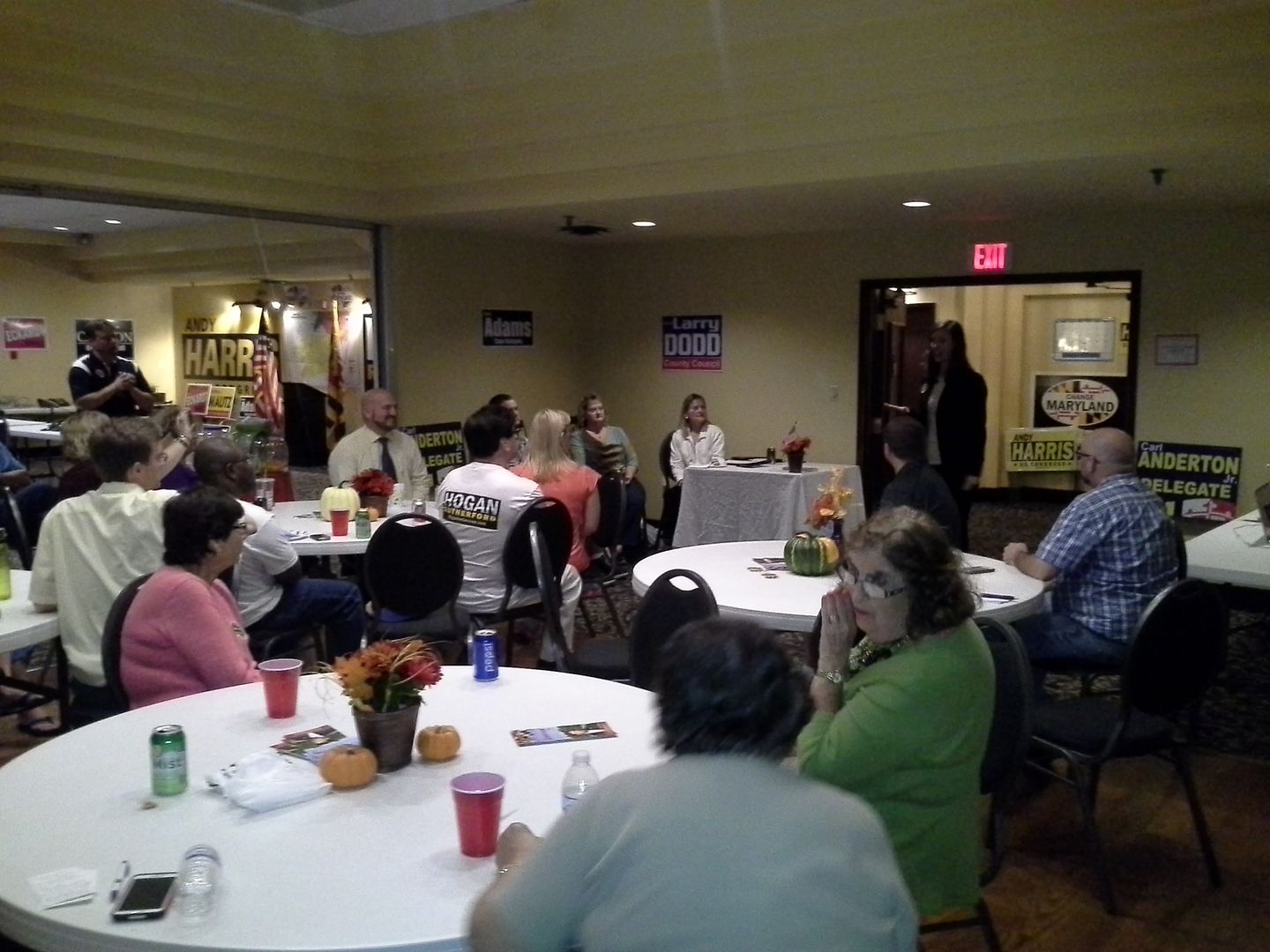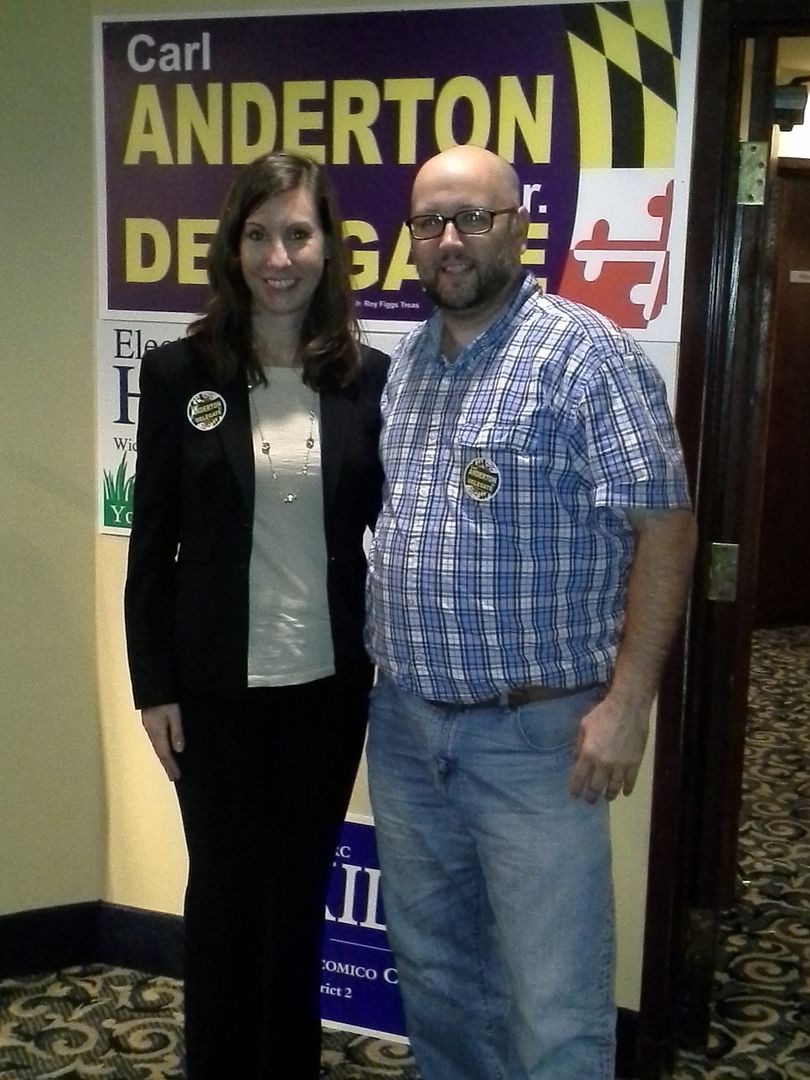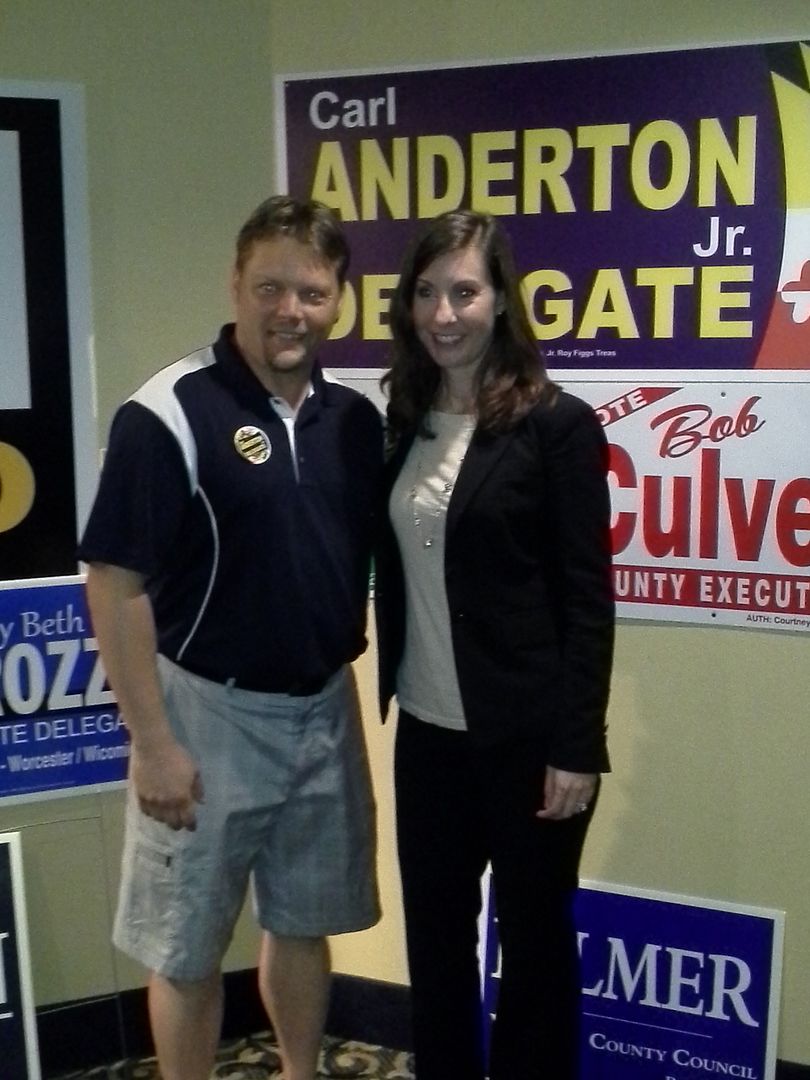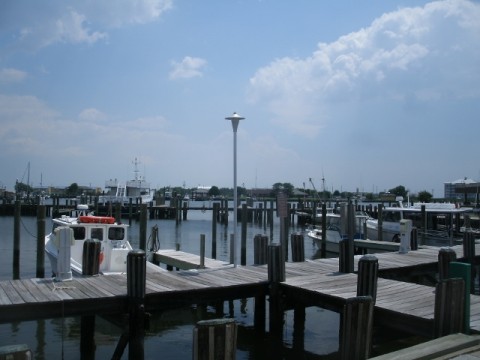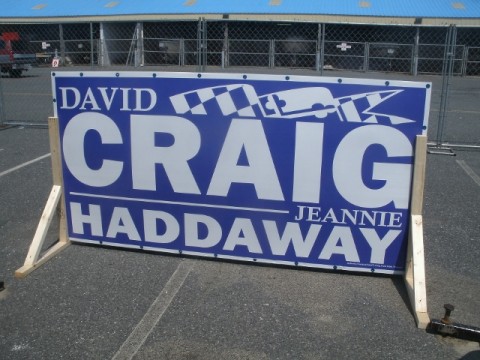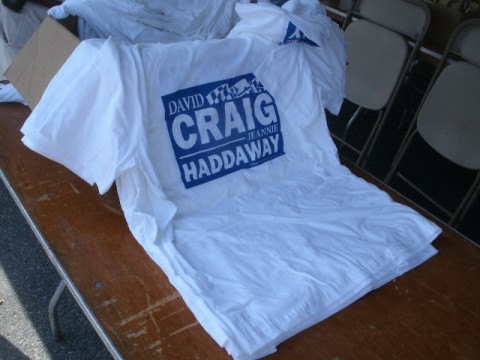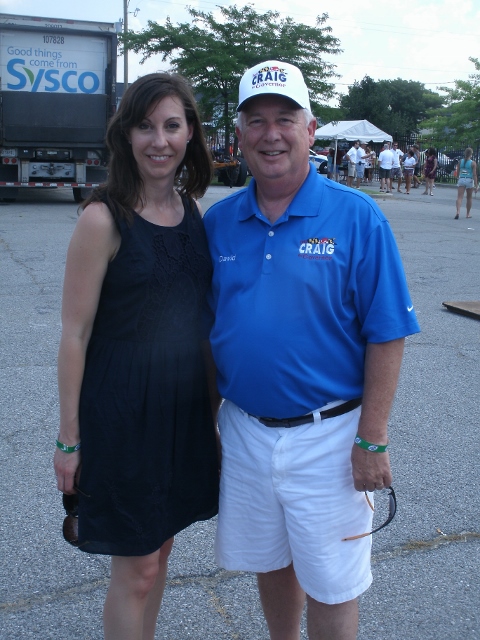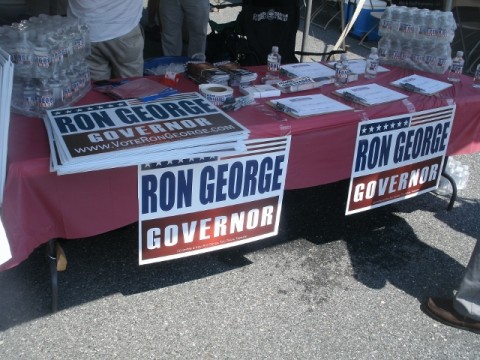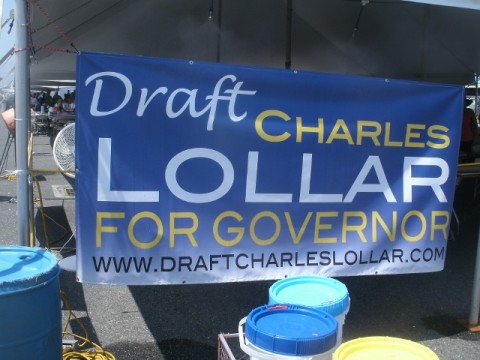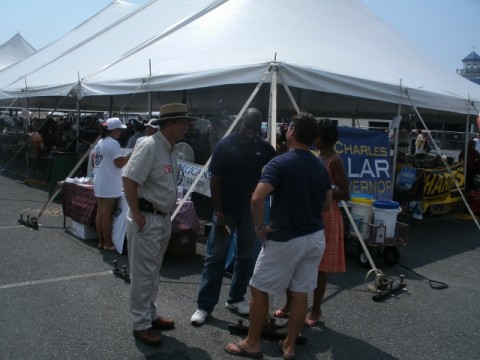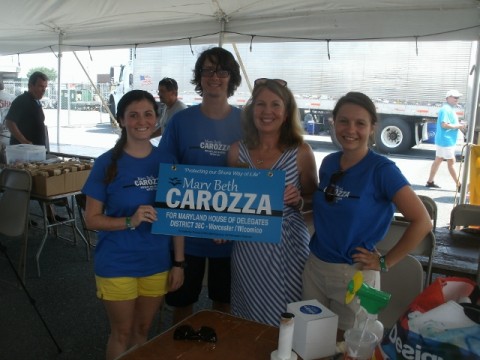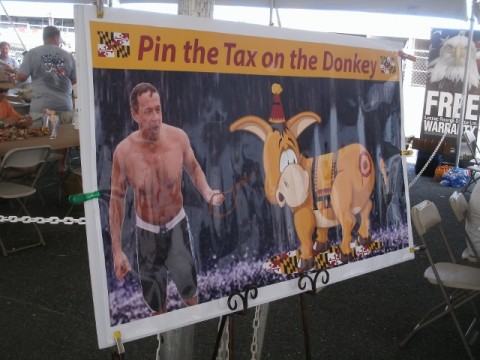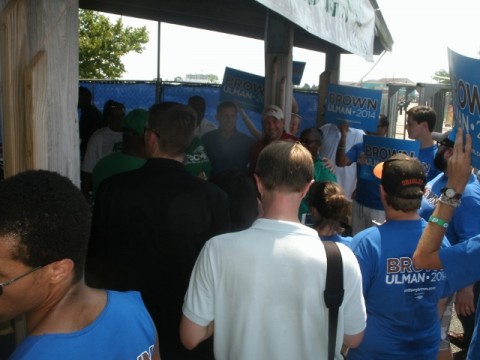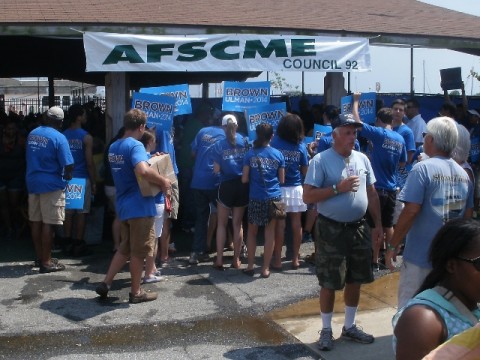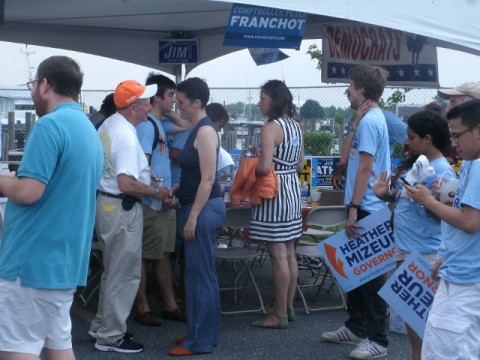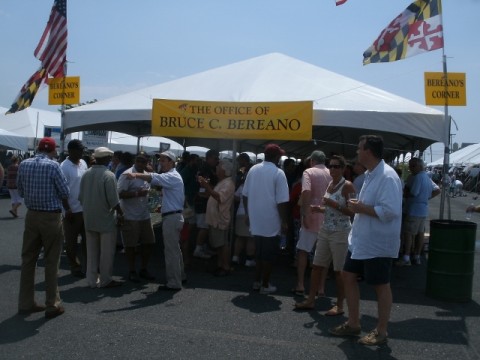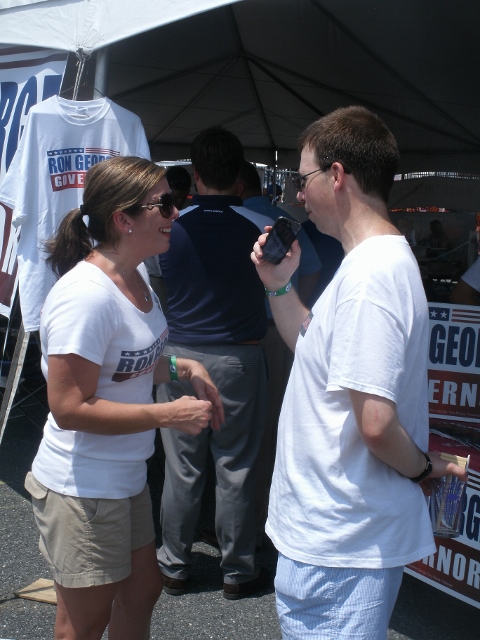I really didn’t intend to have a month-long hiatus in this series, but it now returns with my chat with 2014 state Comptroller hopeful Bill Campbell. Campbell also ran for the job in 2010, and it appears that, should he be successful in the GOP primary, he will have a rematch against incumbent Peter Franchot.
**********
monoblogue: Let me bring my readers up to speed here. You are already in the ring for Comptroller next year, 2014; you ran in 2010, and, assuming you get through the primary – which is not a given, but I would say you’re the odds-on favorite – you’re probably going to have a rematch with Peter Franchot, who thought about running for Governor and decided not to. I guess the first thing I want to know is, since you’ve already ran for the office, do you have any lessons you’re going to move into your 2014 campaign?
Campbell: Absolutely. If there was anybody who was ever a novice, it was Bill Campbell in 2010. I started way too late, I had no organization, I got into the race where the Governor’s race was sucking all of the donations out of the air – it was like there was no oxygen in the room – so when I talked to other candidates who were running for office they said the same thing: they couldn’t raise money because the Ehrlich campaign was basically sucking up all of the money that was available for Republicans, the Republican donors. I started way too late; I started in April or May (of 2010)…
monoblogue: Right.
Campbell: …and I only raised a few thousand dollars, I can’t remember the exact amount.
I spent most of my money in the primary, I think about $11,000 in the primary. Now some of the money I was able to get benefit of in the general election, like my signs, my palm cards, and so forth, but in the general election I only spent $4,000, give or take a few bucks, and I had to make up for that – money’s important, but it’s not the most important thing. The thing I really learned is that people have to know you, they have to like you, and they have to trust you. If you can get those three things, you get their vote.
monoblogue: Well, the question is, you’re running against guy who’s probably got – I don’t know how much Peter Franchot has in the bank, but I’m sure he’s got quite a bit…
Campbell: He’s got a little over $2 million.
monoblogue: …yeah. It’s almost certain, and this is true of almost any Republican in Maryland, practically, that you’re going to be -you’re going to have to work harder and smarter because you’re not going to have the money available to the incumbent.
Campbell: No, and I figured that if Franchot ran for governor I could probably beat somebody who wasn’t an incumbent by only raising about $125,000. I think I have a good shot at Peter if I could raise $250,000. That’s one of the reasons I started early, I’m asking for money, I’m getting donations, it’s not a huge amount right now – at the end of the year when I filed I think I had just a hair under $2,000 – but I had just started asking people for money. So I’m going to get fundraisers this time.
You bring up a good point. Peter raised $1.9 million the last time – and got a million votes – but he spent $1.5 million. I didn’t see where he spent it wisely. Do you remember seeing anything about Peter Franchot except an occasional 4×8 sign?
monoblogue: No. The thing about this race, since it’s an open seat for governor, you’re going to have an all-out war in the primary on both sides.
Campbell: Right.
monoblogue: You’re going to have, most likely, a very competitive race as far as the general election goes, but it’s going to be a little bit like Question 7 was last year. I think it’s going to take up a lot of the available airtime, so you may be right – you may not have to raise a lot of money. Peter Franchot may have a lot left over at the end of this campaign because he’ll have nowhere to spend the money except maybe consultants and what-have-you, the professional political class that we have in Maryland.
Campbell: I like to say that he’s a twice-elected incumbent Democrat. He presently has $2 million in the bank, he beat me once – I have him right where I want him. He’s overconfident.
monoblogue: Yeah, I noticed when Franchot dropped out of the governor’s race, you said ‘good, I don’t have to face the junior varsity now.’ Obviously you knew what you were going to be up against.
Campbell: I was always – I plan on the worst-case scenario. If I didn’t think I had a fair chance – I’m not in this to make a point. I’m not in this to posture or try to get myself well-known for some higher office later on – I’m a pragmatist. I think that it’s very difficult to win as a Republican any time. But I got a lot of non-Republican votes the last time, and Mr. Franchot didn’t get very many non-Democratic votes – I think he got about 10,000 votes that weren’t Democratic. I can’t swear to it because it’s been two years since I looked at it, but I got well over 100,000 votes that weren’t Republican.
So, for one, his name recognition I don’t think is terribly good. He didn’t do a good job spending his money the last time, he’s fighting with people in his own caucus – you know, there are bills in the General Assembly right now to take some of his functions away. He doesn’t seem to be allied with either Mr. Gansler or Lt. Gov. Brown, so I think that he is more vulnerable than the other candidates that we’re going to have to put nominees up against.
And, to be perfectly honest with you, I think that our chickens are about to come home to roost. The reason I ran the last time I got in was the deficit in our state employee and teacher pension fund, and the retiree health care. It has gotten worse. We’ve gone from being funded about 64% to around 60%, and the deficit on the pension has gone from $18.5 billion to $20.5 billion. The retiree health care fund is still around $16 billion in the hole.
So I think that a lot of things are going to come home to roost, I think that the public may be numb after eight years of constant tax increases, taking the budget from about $29 billion – it will be well over 40 (billion dollars) by the time these clowns are finished. And I think that the realization that the Affordable Care Act is neither affordable nor does it provide good care – I think people, even in Maryland, may be at the point where they’re willing to try something different, and by that elect more Republican elected officials.
monoblogue: Well, in Franchot’s case, he’s always tried to portray himself as a fiscal conservative, but in this case – it’s kind of the opposite of the old saying where Republicans can’t win if they try to be liberal because there’s already a liberal party out there. Democrats who try to be conservative, maybe they can’t win because there’s already a conservative in the race and his name is Bill Campbell.
Campbell: Right, and the thing with Franchot – I like Peter, I’d like to have him as a brother-in-law, or a neighbor, or a lodge brother, or something – but he’s not a good Comptroller. He doesn’t have a grasp of the financial issues. And we’re going to need somebody who has an excellent grasp of the financial issues to help get us through.
Part of that is, we’re probably, in my lifetime, going to have a Democratic-majority General Assembly. Thankfully, in Maryland, because of the way it’s constituted, to control the state you only need two offices: you need the Governor and you need the Comptroller so that you can control the Board of Public Works.
monoblogue: Right.
Campbell: If you control the Board of Public Works, then you can control the spending, and you can control the priorities, and you can control the trajectory that Maryland is going to have economically. So whoever our nominee is for Governor, I am going to try to work as closely with them and try to come across as a tag-team that will improve Marylanders’ economic future, the future for their children and their grandchildren.
I think we can have, if we have a good gubernatorial candidate, I think I have more than a fair chance.
monoblogue: Yeah. The other thing that I actually – as I was listening to you, is that, we also need a strong (Republican) party, and it kind of brings me to the next area I wanted to get into. Now I know you ran for state party Chair…in 2010 – you didn’t win, you were third, I think, in the first ballot and then withdrew…
Campbell: Yes.
monoblogue: …Obviously you’re not going to do it this time because you’ve already announced for the Comptroller’s race and you can’t do both at once, but what’s your take on the candidates who are in it so far?
Campbell: You mean for party chair?
monoblogue: Yes.
Campbell: The only one I know who’s really been announced is Diana Waterman. Is there another one?
monoblogue: There are actually two: one is Greg Kline, who’s…
Campbell: Oh, I’m sorry, I did see Greg Kline. I don’t know an awful lot about Greg. I know that he’s been really active in – I read something that was posted, he had a position paper?
monoblogue: Right.
Campbell: When I ran, the reason I ran was, after campaigning statewide, I had been in every jurisdiction at least four times. I talked to people on all ends of the spectrum from the Republican party, and I was very concerned because I thought at the time we needed to replace an establishment figure, Audrey Scott, with somebody who was not in any one camp but could reach across the boundaries between the camps and make a cohesive, unified party. I’m afraid – I liked all of the people who ran before, I liked Alex, I liked Sam Hale, but I’m afraid that if you have somebody who is identified only with one faction, the other factions are going to withdraw and we’re not going to be very successful.
That was why I ran, but if somebody had come to me and said – and I had talked to Alex when he ran, and I am 99% sure he assured me he would stay for four years. That was one of the reasons I thought, well, okay, and then I saw where he was raising money, he was using the party imprimatur of the chairman to raise money for a potential run for Roscoe Bartlett’s seat, which I thought was improper.
monoblogue: Right. (laughs) Go ahead, I keep interrupting you.
Campbell: When I ran, I was going to make it a non-paid full-time job, because I think whoever our chair is, until we start to get on a roll, we need to have somebody who is going to work full time, who is going to reach outside the party to constituencies like the businessmen in Baltimore City who have property that’s being adversely affected by the Maryland State Center project – we need to go in and proselytize people that we don’t normally talk to. Whoever is going to run and be our Chair needs to do that, in my opinion.
monoblogue: Well, actually you’ve answered the next question I was going to ask. The other gentleman, by the way, who’s in the race is Collins Bailey – I think he’s out of Charles County.
Campbell: Oh, I know – I know Collins Bailey. I met Collins when he was running against Charles Lollar to be our nominee for the Fifth Congressional District. I like Collins, he’s a nice guy, he’s conservative, I don’t know what kind of support he has among the Central Committees, because as far as I know he’s just widely known in southern Maryland.
monoblogue: Yeah, that’s my impression of him, too. I mean, I know who he is, I’ve probably talked to him once or twice, but – any of those candidates, and I know Diana, too, has actually done this and Greg Kline is in the process of doing this – they need to get out and get to all 23 counties if they can before the race. That’s the key.
Campbell: I think – isn’t there going to be in Montgomery County…isn’t there going to be a panel discussion with all of them?
monoblogue: There could be, I’m not sure. I know, for example, Greg Kline is coming to our Lincoln Day Dinner Saturday – I think Collins Bailey is trying to get there too. Diana Waterman will be there too, I’m sure, because she’s from the Eastern Shore. So I think – I don’t think anyone else is going to get in, I would be surprised if they did now. And you kind of answered my next question, I was going to ask what advice you had for the winner, but you’ve already kind of given that, so let me turn to one other thing real quick: I wanted to talk about – and I know you have a little expertise on federal matters because you used to run Amtrak, and you probably have a little bit of insight into the budget process…
Campbell: Yes, I had 30 years in the federal government, 19 as a career senior executive, and two years as a Presidential appointee as an assistant secretary for management at the VA. So I know a lot about the federal government.
monoblogue: So what do you think about all this talk about – obviously we started with sequestration, and now we’re talking about the possibility of some shutdown or other, and getting a budget out because they have to – they have to get a budget out or they don’t get paid. If you wave a magic wand, what does Bill Campbell do about this whole deal?
Campbell: Well, here’s the thing you have to remember. I’ve been looking at it through the lens of ‘how is this going to affect Maryland?’ I want to run for Maryland office, and – if I succeed and I win – I’m responsible for the finances of the state. And I look at it – Maryland, over the past four decades, has become a ward of the federal legislature. We get approximately 40% of our state revenue to run our government directly and indirectly from the feds. We get 27% directly, and then we get about another 13% indirectly through income taxes, property taxes, sales taxes from federal employees, federal retirees, and federal contractors and military retirees, and to some extent property tax from perhaps military – active-duty military.
So regardless of whether you call it sequestration, the fiscal cliff: no matter what you do any – any – reduction in federal spending will adversely affect Maryland. That said, we desperately need to cut back on the spending. That’s going to be painful, but if we don’t do with everybody, even the liberals agree that our spending is on an unsustainable path.
We are borrowing 42 cents on every dollar that we spend at present, and we – the debt service right now is, I believe 200 or 300 billion dollars and we are paying historically low rates on that debt. In a couple of years, when the fed stops doing quantitative easing, even Bernanke has admitted by about 2015 the interest rates that we are going to be paying – which are all pegged to the 10-year Treasury note – are going to jump up to the historic value of about 4 or 5 percent. What that means is that the largest single budget item to the federal government will be debt service. That will crowd out spending we need for infrastructure, defense, clean air, safe food, safe drinking water, public health – everything will become secondary so that we have to cut the spending.
And there are smart ways to do it and dumb ways to do it. Sequestration, when you look at it, isn’t that bad, particularly if you put, as they are right now, flexibility for the federal agencies in there. The Department of Defense’s budget this year is $711 billion – you think, oh my God, under sequestration we’re going to go to 522 (billion dollars.) Well, 522 might be absolutely fine because the difference between 521 and 711 is fighting two wars. As we get out of Iraq and Afghanistan, and we avoid going into places like Iran and Syria, and Africa – then we can absorb that reduction well.
So I’m not afraid the sky is going to fall, I think what has happened is that the Obama administration has tried to make sequestration as painful as possible – you know, letting 2,000 illegal aliens loose that were in custody, closing down tours of the White House – they are doing everything humanly possible to make this appear a big problem. Well, I just came back from Florida and, you know, except for an occasional little mention of sequestration it’s not on anybody’s radar outside the Beltway, and it doesn’t seem to be having much of an effect because, rather than a cliff, it’s kind of a slow, gentle slope with the cutbacks and spending and you probably won’t really see it until next year and next year is when the Affordable Care Act costs are going to start to really hammer people, so I think 2014, because of these things, is going to be a decent year for Republicans, even in Maryland.
monoblogue: Well, that’s a good place to wrap it up. So I appreciate the time, Bill.
**********
We actually talked a little bit more regarding the 2014 race, but for the purpose of this exercise I’ll keep that off the record. One thing I will share is his opinion that “Maryland’s finances are terribly broken.” Seems to me that’s a good reason to get into the race, and I wish Bill the best of luck in his uphill fight.
I should also note that I recorded this interview on Friday, so I had the opportunity to speak with all three Chair candidates at our Lincoln Day Dinner subsequent to recording this post.
Next week’s guest will be another Maryland political figure, with the question being which one of the two records his interview first.



